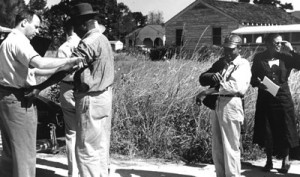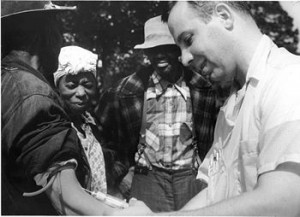 From 1932 to 1972, 399 poor black sharecroppers in Macon County, Alabama were denied treatment for syphilis and deceived by physicians of the Unites States Public Health Service. As part of the Tuskegee Syphilis Study, designed to document the natural history of the disease, these men were told that they were being treated for “bad blood.”
From 1932 to 1972, 399 poor black sharecroppers in Macon County, Alabama were denied treatment for syphilis and deceived by physicians of the Unites States Public Health Service. As part of the Tuskegee Syphilis Study, designed to document the natural history of the disease, these men were told that they were being treated for “bad blood.”
In fact, government officials went to extreme lengths to insure that they received no therapy from any source. As reported by the New York Times on 26 July 1972, the Tuskegee Syphilis Study was revealed as “the longest nontherapeutic experiment on human beings in medical history.”
 The Tuskegee syphilis experiment (also known as the Tuskegee syphilis study or Public Health Service syphilis study) was in fact an infamous clinical study to determine the natural progression of untreated syphilis in poor, rural black men who thought they were receiving free health care from the U.S. government.
The Tuskegee syphilis experiment (also known as the Tuskegee syphilis study or Public Health Service syphilis study) was in fact an infamous clinical study to determine the natural progression of untreated syphilis in poor, rural black men who thought they were receiving free health care from the U.S. government.
The 40-year study was controversial primarily because researchers knowingly failed to treat patients appropriately after the 1940s validation of penicillin as an effective cure for the disease they were studying. Revelation of study failures by a whistleblower led to major changes in U.S. law and regulation on the protection of participants in clinical studies.